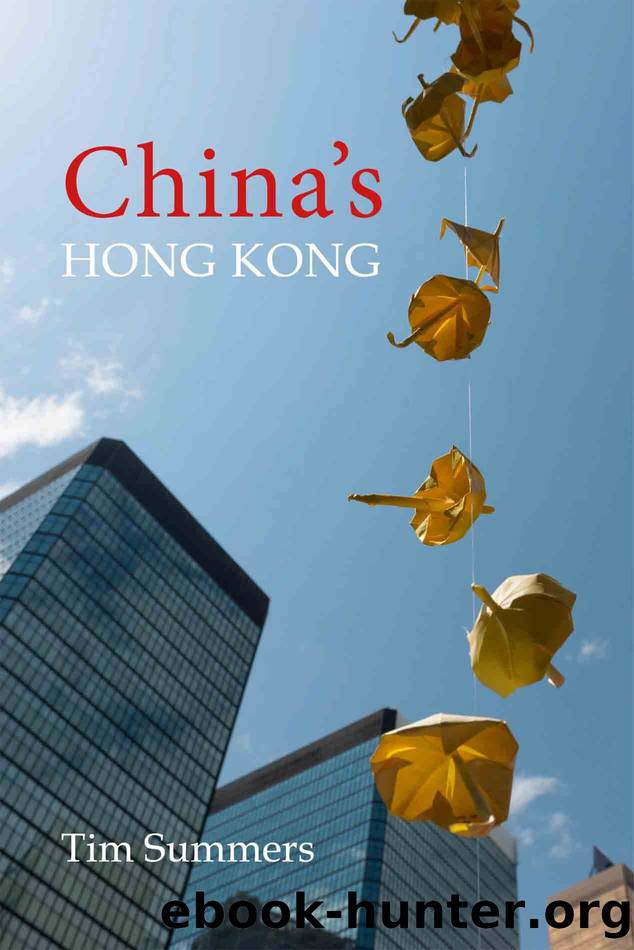Islam and China's Hong Kong: Ethnic Identity, Muslim Networks and the New Silk Road by Wai-Yip Ho

Author:Wai-Yip Ho [Ho, Wai-Yip]
Language: eng
Format: epub
Tags: Ethnic Studies, Religion, Social Science, Islamic Studies, Islam, Regional Studies, General
ISBN: 9781134098071
Google: IPm4DU8MMNIC
Goodreads: 18097003
Publisher: Routledge
Published: 2013-06-07T00:00:00+00:00
Protests and political stalemate
The Occupy movement had its roots not just in Hong Kong politics, but as the name suggests took some inspiration from protestors elsewhere. Even if the formal goals of Hong Kongâs Occupy movement were articulated mainly around the question of democracy, the wider socio-economic context of growing inequalities contributed to levels of support for the protestors, and were cited by some as explicit motivation for their dissatisfaction with the Hong Kong and central governments. Numerous grievances were voiced, in particular over the difficulties many faced in affording housing in Hong Kong. In the context of growing wealth and income disparities in Hong Kong, it has been argued that these socio-economic issues were an important factor in explaining the extent of the protests. This has intertwined the political and economic in a way not seen in previous major protests, for example those over Basic Law Article 23 legislation in 2003 or national and moral education in 2012.
As a movement, Occupy was generally seen as having been initiated in 2013 by two academics and a pastor. Their sources of inspiration were wide. Although the name came from the anti-capitalist and anti-globalization movements in the US and elsewhere, their original proposed modus operandi was non-violent civil disobedience, with Gandhiâs fight against British imperial rule in India an oft-cited inspiration. Its full name was âOccupy Central [Hong Kongâs main business district] with love and peaceâ. Successful protests in Taiwan in early 2014 against an economic agreement with mainland China were a more immediate source of inspiration.
For over a year, the movement remained more of a possibility than a reality, a threat hanging over the government as it moved forward with devising proposals for constitutional reform. As tempers rose in September 2014, prompted by the 8-31 Decision and fuelled by the chief executiveâs unwillingness to meet with protestors, it was student activists who moved into the frontline of opposition to the NPC Standing Committeeâs position and the Hong Kong governmentâs support for it. The key figures were Joshua Wong, Nathan Law and Alex Chow, in their late teens and early 20s. Wong â who had cut his protesting teeth in successfully pushing the government to postpone the introduction of MNE in 2012 â has since become a household name, not just in Hong Kong, but overseas, featuring on the cover of Time magazine in October 2014.
Following protests and scuffles outside the Hong Kong government office compound on 26 September during which protestors forced their way into the forecourt of the government offices, it was the student leaders rather than the original three âfoundersâ of Occupy, who kicked off what would turn out to be 79 days of street protests in the heart of Hong Kongâs business district. Initially, the three were arrested and held for three days. Amidst chaotic scenes, on 28 September the Hong Kong police used tear gas to try to disperse protestors, but this only succeeded in bringing more people onto the streets in support, and a narrative of persecuted protestors developed in Hong Kong and spread overseas, boosting support for the protests.
Download
This site does not store any files on its server. We only index and link to content provided by other sites. Please contact the content providers to delete copyright contents if any and email us, we'll remove relevant links or contents immediately.
Spell It Out by David Crystal(36106)
Life for Me Ain't Been No Crystal Stair by Susan Sheehan(35792)
Cecilia; Or, Memoirs of an Heiress — Volume 1 by Fanny Burney(32533)
Cecilia; Or, Memoirs of an Heiress — Volume 2 by Fanny Burney(31931)
Cecilia; Or, Memoirs of an Heiress — Volume 3 by Fanny Burney(31923)
The Great Music City by Andrea Baker(31907)
Professional Troublemaker by Luvvie Ajayi Jones(29644)
We're Going to Need More Wine by Gabrielle Union(19028)
The Secret History by Donna Tartt(19011)
Twilight of the Idols With the Antichrist and Ecce Homo by Friedrich Nietzsche(18611)
All the Missing Girls by Megan Miranda(15910)
Cat's cradle by Kurt Vonnegut(15316)
Pimp by Iceberg Slim(14472)
Bombshells: Glamour Girls of a Lifetime by Sullivan Steve(14043)
For the Love of Europe by Rick Steves(13840)
Talking to Strangers by Malcolm Gladwell(13338)
Norse Mythology by Gaiman Neil(13325)
Fifty Shades Freed by E L James(13224)
The Social Justice Warrior Handbook by Lisa De Pasquale(12179)
